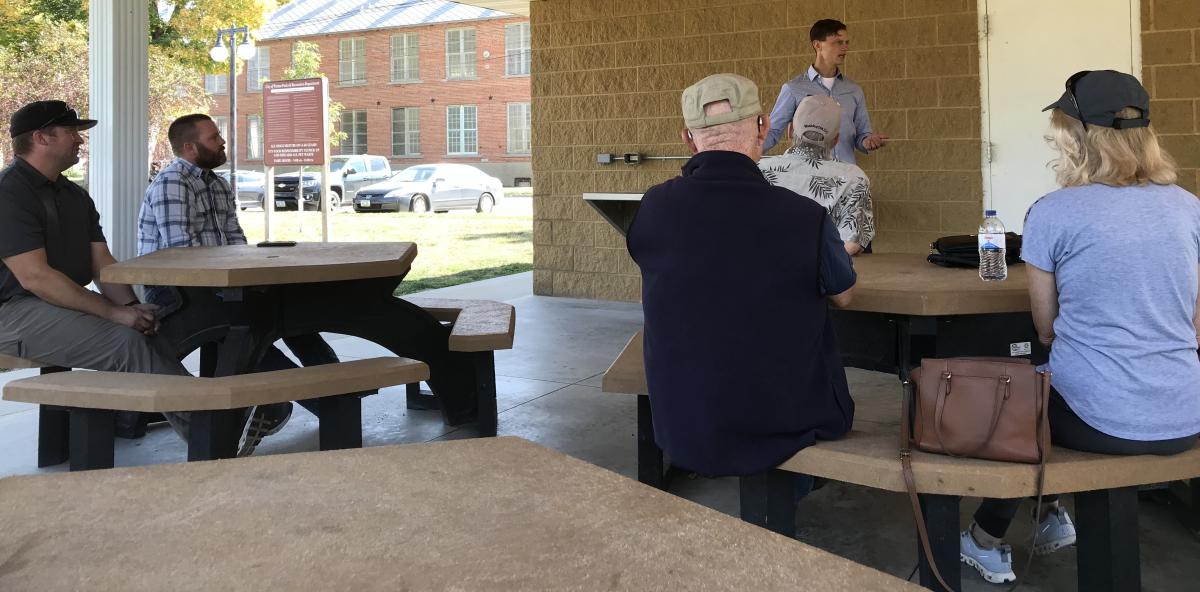Iowa's State Auditor Rob Stand made a stop in Vinton to discuss his job as Auditor. Before beginning the meeting, he spotted an old friend that he had met while working with Americorp, Jimmy Kelly. The two men had worked together making home repairs while they were serving together in the corps.
Sand spoke of the challenges he faces at the state level in his attempts to audit several of the state offices. He felt that changes needed to be made by Iowa lawmakers to enable him to better audit offices in the state government. Almost daily Vinton Today receives an update of the work that Sands office does in the state.
He made several suggestions concerning the departments that need to be changed but he faces the challenge of convincing lawmakers to cooperate. He likened his office to that of a police officer and if you see one while driving. He said his office is there to remind you to follow the rules but often they are stopped from doing so by laws passed at the state level.
One example can be seen in the letter released this week from his office. The letter is addressed to the Iowa Speaker of the House, Pat Grassley. The letter is a Response to the Misallocation of Funds.
"Speaker Grassley,
After years of you not responding to me reaching out about working together for Iowans, I am delighted you are now interested in the State Auditor’s Office. This letter is the response you requested, and informs you of basic auditing standards and Iowa law that you do not appear to understand, as well as repeating some ideas for ways the legislature can quit making the situation worse.
First, Iowa’s audits run on fiscal years. A fiscal year begins on July 1 and ends on June 30. For example, FY23 ended June 30, 2023. This is important because, as you note, we learned about the Judicial Branch’s issue on October 7, 2022. That date is in FY2023. So, when you then wrote “audits of the Judicial Branch issued by your office for Fiscal Years 2021 and 2022 do not mention these issues” you publicly demonstrated that either 1) you don’t know what a fiscal year is, or 2) you pretended not to in order to push a partisan political attack.
Second, we have yet to issue the Judicial audit for FY23. We have been following the ongoing efforts at judicial to understand and remedy these issues—but legally, we haven’t been allowed to tell you about them. That is because we are legally required to maintain confidentiality of our audit workpapers under Iowa Code 11.42, “including all allegations of misconduct or non-compliance.” That’s why when the Democratic National Committee twice asked us for all allegations of wrongdoing by Governor Reynolds, we refused to provide any. So, you complaining that we didn’t report something in an audit we haven’t released, is you complaining that we didn’t break the law just for you.
Third, as you know, the Judicial Branch said from the start that they would hire a specialist to address this. I’m sure you’d agree that if we duplicated that effort, it would be a waste of taxpayer resources.
Fourth, you voted for the most pro-corruption law in Iowa history, which ended our ability to audit these very issues, along with many others. The bill that you voted for, SF478, was such a terrible idea that even the American Institute of CPAs, which writes the auditing standards followed by every auditor in America, wrote a letter to tell you so. Under that law, you barred us from being able to review programming infrastructure, like the coding issue that misallocated the funds.
Fifth, it is basic knowledge that that no auditor can actually reallocate funds to correct misplacements. The independence mandate of any auditor limits them to telling the auditee what they need to fix. The auditor cannot fix it for them.
The coding errors at Judicial are a problem, but a solvable one. The issues are complex and problems are longstanding, and getting to the root of the issue is essential. That takes time, but everything is happening as standards dictate. Experts have reviewed the issues and Judicial has a plan in place moving forward. Our office will review the final figures when Judicial presents them, and report any findings as necessary in our FY23 reports on Judicial and the Clerks of Court. This was always going to happen, regardless of you inserting yourself.
There are a number of things the legislature can do to quit making the situation worse. First, don’t give the Judicial Branch three weeks to overhaul its coding before your mandated changes take effect. Second, repeal SF478, which makes it illegal for us to audit issues like this. Third, recognize that our appropriation from the legislature is less than what it was in 1985, without adjusting for inflation, and to give us the resources to dive deeper while passing the legal fix to improve efficiency. Fourth, all this money is sitting in government accounts, waiting to be reallocated.
Most importantly, you should publicly apologize to our staff that works on the Judicial Branch audit for publicly attacking their work out of either partisan politics or ignorance. They work hard and are proud of it. Iowans should be too.
Sincerely, Rob Sand Auditor of State
CC:
Representative Mike Bergan – Administration Subcommittee Chair
Representative Brooke Boden – Government Oversight Committee Chair
Representative Brian Lohse – Judiciary and Justice Systems Budget Sub Chair
Representative Gary Mohr – Appropriations Committee Chair
Representative Steve Holt – Judiciary Chair
Representative Matt Windschitl – House Majority Leader
Representative Jennifer Konfrst – House Minority Leader
Director Kraig Paulsen – Department of Management
Senator Amy Sinclair – President of the Senate
Senator Jack Whitver – Senate Majority Leader
Senator Pam Jochum – Senate Minority Leader"



Comments
Submit a CommentPlease refresh the page to leave Comment.
Still seeing this message? Press Ctrl + F5 to do a "Hard Refresh".